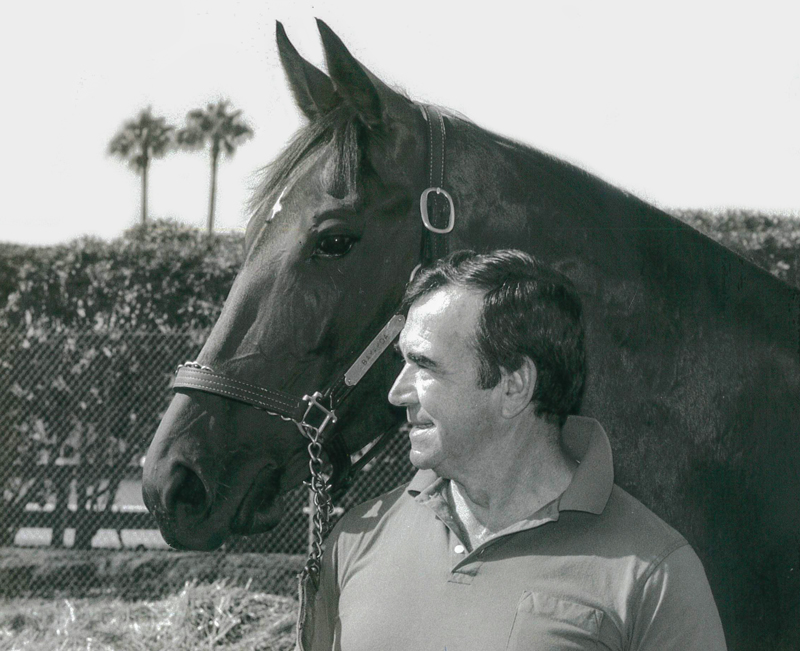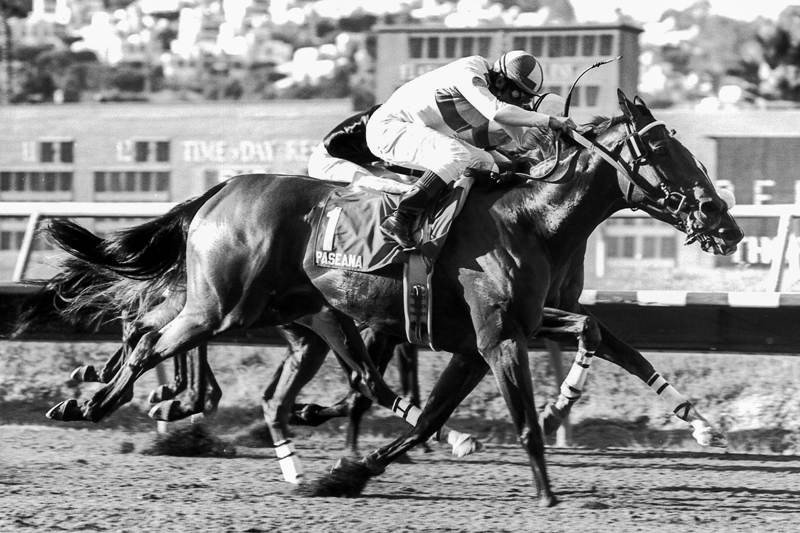
Trainer Ron McAnally and his champion mare Bayakoa at Del Mar in 1990.
Hall of Fame trainer Ron McAnally can be found in the mornings seated in a chair on the second floor balcony of his Barn I on the backside of the Del Mar racetrack. That’s been his special spot for more than 50 years. High enough to see over the fence and view the horses putting in their morning works. Very unassuming for a living legend whose career spans decades and whose accomplishments are unequaled.
McAnally will be honored this weekend with the prestigious Pincay Award, bestowed annually to an individual who has served horse racing with “integrity, extraordinary dedication, determination and distinction.” Past award winners include Noble Threewitt, Mel and Warren Stute, Jerry and Ann Moss, Art Sherman, Eddie Delahoussaye and Chris McCarron, to name a few.
McAnally and Pincay, who’ll hand McAnally his award Saturday, go back a long way and, in fact, they still hang out together.
“I work out in a gym (in Arcadia) with him,” the 90-year old McAnally says, “and I tell everybody, he (Pincay, who is 75) could ride tomorrow. He’s kept his weight down real good.”
You know you’re in the presence of racing royalty when McAnally talks about the riders he used to employ.
“Laffit and Chris McCarron and (Bill) Shoemaker, some of the best,” McAnally says. “We won a lot of races.”
You won’t find anyone who’s been coming to a particular racetrack for as long as McAnally’s been coming to Del Mar. This is his 74th summer here. He first came to the seaside oval in 1948, and yet, McAnally will tell you, he didn’t set out to be a horseman.
“Many years ago I went to the University of Cincinnati,” McAnally begins. “I was going to be an electrician, a repair man and all that. But it was something that needed a lot of math and I was bad in school. We were raised in an orphanage in Kentucky, five of us. My mother and father died when we were very young. My uncle (Reggie Cornell of Silky Sullivan fame) came to me and wanted to know if I wanted to work at the track, at Rockingham Park in New England. So I was walking horses and cooling them off. I started at the bottom making $30 a week. That’s how I learned to love horses.”
After that, he was a groom and then an assistant trainer and in 1952 he started training at Hollywood Park.
“If you have a good horse, you can train him,” McAnally says. “(Bob) Baffert tells me what he does, how he worked him a mile and that stuff and I tell him, ‘Bob, I don’t want to hear that; just give me the horse.’ Like John Henry, I had the horse.”
John Henry was Ron McAnally’s wonder horse. The smallish, nondescript gelding came to him as a 4-year-old.
“Sometimes a horse needs a little psychology,” McAnally says. “The guy that had him before me used to beat him because he was so mean. And then they gelded him so when we got him, he wasn’t a pretty horse. At the sale he brought $1,500. So I started thinking, treat him nice. Give him sugar and apples and carrots and be as nice as you can.
“We’d go to the track and usually, if a horse stops and doesn’t move, the exercise boy might beat him. I said ‘No, let him take his time.’ So he took his time after that and then we started running him and he finished second and I said ‘He might be okay.’ Then we ran him back again and he won.”
Soon John Henry was winning in bunches. In 1980, he rattled off six straight wins, capped by a victory in the G1 Hollywood Invitational. In 1981, he won five in a row including the first of two G1 Santa Anita Handicaps. After finishing fourth in the Hollywood Gold Cup, he won five of his next six races including his first Arlington Million.
As for which John Henry race does McAnally consider to be the best he ever ran?
“There were so many, I can’t tell you,” McAnally says. “The Arlington Million, I guess. The most important thing is this: Horses, when they’re five or six, like any athlete, they start to tail off. Basketball players, football players they start to go downhill. Yet John Henry was Horse of the Year at age nine.”
John Henry won his second ‘Big Cap’ in 1982 and his second Arlington Million in 1984 before retiring later that year. Amazingly, when he was retired, he was in the midst of a four-race win streak and had won six of his last seven races.
He was the Eclipse Award winning grass horse four years running and was named Horse of the Year in 1981 and ’84. John Henry was inducted into the Racing Hall of Fame in 1990.
Most of the time, a trainer has a great horse and that’s it, that’s why they call them a Horse of a Lifetime. But McAnally had not one, not two, but three Hall of Famers, which is more of a testament to his training ability than he’s willing to admit. In 1988, a horse named Bayakoa came to him from Argentina.
“She was fast and won a Breeders’ Cup for us,” he said. “Laffit rode her. He said it was the best filly he had ever ridden. A connection down in South America told us there’s a real nice filly down here, so we bought her and she won everything.”
Bayakoa won five in a row in 1989 including the Santa Margarita, the Vanity and the Milady, all Grade 1 races at the time. After a loss in the Chula Vista at Del Mar, she clicked off another five straight wins including the 1989 Breeders’ Cup Distaff.
The winning continued in 1990. Bayakoa won five of six races including her second Breeders’ Cup Distaff. She won the Eclipse Award for best older mare in both 1989 and 1990 and was voted into the Racing Hall of Fame in 1998.

Champion Paseana is up to win the 1994 Chula Vista Handicap by a nose at Del Mar under Chris McCarron in 1994.
A few months after Bayakoa left the barn, another Argentine-bred named Paseana came to McAnally. From November of 1991 to July of 1992, she won seven in a row and would go on to give McAnally his third Breeders’ Cup Distaff win. She won the Eclipse Award for older mare in 1992 and ’93 and was inducted into the Hall in 2001. He remembers her owners.
“Sid and Jenny Craig. They were very good clients, just like the man who owned John Henry, Sam Ruben,” McAnally recalled. “The ones (owners) that are bad, they start telling you what to do. When that happens you get confused; they want to run them here, they want to run them there. That’s what they pay you, the trainer, to do. They want to treat it like their own business, but I’m here seven days a week and I think I know what I’m doing.”
Who could argue with that? McAnally has been named an Eclipse Award winner as trainer of the year three times -- 1981, 1991 and 1992. He was inducted into the Hall of Fame along with John Henry in 1990. At Del Mar, he was the track’s leading trainer for number of wins for a dozen years and now still ranks fourth with 447 firsts, as well as third in stakes victories with 77.
He has always enjoyed his summers at Del Mar and holds the highest regard for the man who runs the place.
“Joe Harper is one of the best,” McAnally says. “I’ve known Joe all my life. His mother had horses. You see that grandstand? It was half that big when he went to work here. He got the new one built and it’s great. Joe is one of the ones.”
McAnally has five horses in his barn at Del Mar this summer, four of which he owns. He can’t do it anymore, but back in the days of the old grandstand, McAnally would take his horses to the beach.
“We used to take them out there, under the railroad tracks,” McAnally remembers. “They’d lay down in the sand and roll. We’d take them out in the water. They loved it. They’d relax. It would give them a chance to get out. I feel sorry for horses sometimes because they’re in their stalls for 23 hours out of 24. When we took them to the beach it gave them more time to get out and stand in the salt water. But those days are gone now.”
When you’ve been around something for as long as McAnally’s been around racing, you’re going to see a lot of changes and his ability to adapt to those changes contributed to his longevity. There was a time when horses ran a prep race on a Tuesday and came back to run in a stakes race that weekend. Not in McAnally’s barn.
“If you run a horse every week,” McAnally says, “they’re not going to run good. With three weeks they get a chance to build themselves up, get their strength back, eat better, train and relax. If you run them every week, they’re not going to run their best.”
That’s how you compile 70-plus years of experience training horses and reach the highest pinnacle of your sport. This week he’ll be making more room in his trophy case for the Pincay Award, which he will receive in the winner’s circle between races on Saturday. He most certainly is a deserving recipient.
